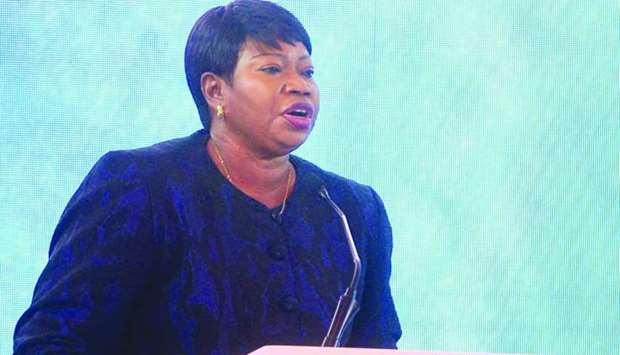The Middle East region can play an important role in fostering greater adherence to principles of international criminal justice and the rule of law, said Fatou Bensouda, prosecutor of the International Criminal Court (ICC).
She was delivering the inaugural address at the 19th World Congress of Criminology Monday at Ritz Carlton Doha.
“Based on its rich cultural and historical experience and its centrality to world affairs, the region has an important role in helping the world meet humanity’s requirements in the region and beyond,” the ICC official explained.
“By joining the ICC, countries from the Middle East will have a direct say in the shaping and continuous development of the ICC and the wider system of international criminal justice, while at the same time sending a clear signal to the people of the region, and beyond, that they no longer need to fear for being subjected to gross human rights violations,” she said.
Bensouda hailed the efforts by Qatar and its contributions to the development of areas related to the implementation of law at the global level and the fulfillment of its obligations in ensuring criminal justice and the rule of law.
The ICC prosecutor recalled the first regional inter-ministerial diplomatic conference held in Doha in 2011 at the same venue with the aim of raising awareness on international criminal justice and the ICC.
"This Congress, with its focus on teaching and educating, is the perfect occasion to recall the reforming power of innovation and ideas towards greater justice awareness and indeed, justice, tangibly experienced.
“I am confident that these values and objectives will be further studied and promoted, whether at Qatar University, Qatar Police College, the International Society of Criminology, UNODC, and elsewhere,” she said.
The prosecutor said ICC is making attempts to play its part in advancing a culture of accountability for the most serious crimes that shock the conscience of humanity. “Atrocities, no matter who the perpetrator, will be checked by ICC through the power of the law,” she added.
Pointing to the need for more efforts to ensure criminal justice both domestically and internationally, she said more law and institutions that study, teach, promote and enforce the rule of law are required.
“The ICC Office of the Prosecutor that I lead is a continuously learning office. It follows the latest developments in new and emerging trends and technologies along with scientific methods and procedures. We look to reinforce our capabilities in the collection, management and analysis of evidence relating to the investigation and prosecution of crimes listed in the Rome Statute,” she said.
“The ICC is committed to the important mandate bestowed upon us by the Rome Statute, as we are clear eyed about the immense responsibility. Situations under preliminary examination by the court include those in Colombia, Venezuela, Nigeria, Ukraine, Iraq, Palestine, and the Philippines. Our work is ever-expanding,” she added.
Fatou Bensouda, who said the ICC benefits from the membership of 122 states presently, asked more countries to seek to join the Rome Statute as a means to contribute to greater security and stability where it is most needed.
“Based on its rich cultural and historical experience and its centrality to world affairs, the region has an important role in helping the world meet humanity’s requirements in the region and beyond,” the ICC official explained.
“By joining the ICC, countries from the Middle East will have a direct say in the shaping and continuous development of the ICC and the wider system of international criminal justice, while at the same time sending a clear signal to the people of the region, and beyond, that they no longer need to fear for being subjected to gross human rights violations,” she said.
Bensouda hailed the efforts by Qatar and its contributions to the development of areas related to the implementation of law at the global level and the fulfillment of its obligations in ensuring criminal justice and the rule of law.
The ICC prosecutor recalled the first regional inter-ministerial diplomatic conference held in Doha in 2011 at the same venue with the aim of raising awareness on international criminal justice and the ICC.
"This Congress, with its focus on teaching and educating, is the perfect occasion to recall the reforming power of innovation and ideas towards greater justice awareness and indeed, justice, tangibly experienced.
“I am confident that these values and objectives will be further studied and promoted, whether at Qatar University, Qatar Police College, the International Society of Criminology, UNODC, and elsewhere,” she said.
The prosecutor said ICC is making attempts to play its part in advancing a culture of accountability for the most serious crimes that shock the conscience of humanity. “Atrocities, no matter who the perpetrator, will be checked by ICC through the power of the law,” she added.
Pointing to the need for more efforts to ensure criminal justice both domestically and internationally, she said more law and institutions that study, teach, promote and enforce the rule of law are required.
“The ICC Office of the Prosecutor that I lead is a continuously learning office. It follows the latest developments in new and emerging trends and technologies along with scientific methods and procedures. We look to reinforce our capabilities in the collection, management and analysis of evidence relating to the investigation and prosecution of crimes listed in the Rome Statute,” she said.
“The ICC is committed to the important mandate bestowed upon us by the Rome Statute, as we are clear eyed about the immense responsibility. Situations under preliminary examination by the court include those in Colombia, Venezuela, Nigeria, Ukraine, Iraq, Palestine, and the Philippines. Our work is ever-expanding,” she added.
Fatou Bensouda, who said the ICC benefits from the membership of 122 states presently, asked more countries to seek to join the Rome Statute as a means to contribute to greater security and stability where it is most needed.


